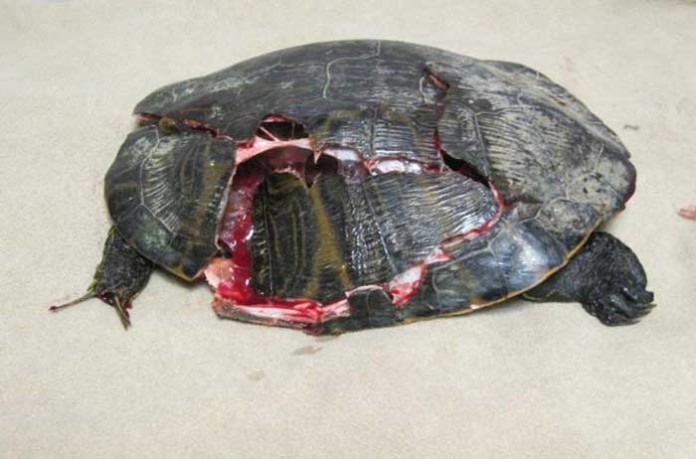Red eared sliders aren’t necessarily prone to injury—they do have a hard shell, after all!—but if housed in improper conditions or not handled properly they can sustain life-threatening injuries. Educating yourself about proper housing and handling is the first thing you need to do to make sure that you and your turtle never have to go through dealing with an injury.
The first thing you need to know is that red eared sliders can be a bit rough on their environment. As a result, their environment needs to be able to give a little when the turtle gets rough. Your water heater, for example, simply must have a guard. This guard will serve two functions. First, it keeps your slider from burning itself on the heater. Second, it keeps your slider from breaking the heater by bumping into it when swimming. If the heater breaks, your turtle’s water will cool rapidly and then you could be dealing with a temperature sick turtle.
You also have to worry about your red eared slider injuring itself on the rocks in its habitat. Before placing any rocks in your turtle’s habitat, make sure that you wash and inspect them thoroughly beforehand, keeping an eye out for any sharp spots that could cut or abrade your turtle’s skin. Sliders are tough, yes, but a little skin abrasion can quickly get infected and possibly even kill your turtle.
When it comes to handling your red eared slider, always take care to make sure you don’t drop it. Dropping your turtle could crack its shell, which is often disastrous. For terrestrial turtles, this is a problem more easily remedied, but sliders need to eat in water, so the more common epoxy repair methods are a little more difficult. Also, never let a young child or someone that is afraid or unfamiliar with the turtle hold it. Sliders can be very active, poking their head out and kicking their feet, which could unnerve some folks and cause them to drop it. All in all, it’s just a bad situation.
What it all boils down to when preventing red eared slider injury is consideration. Your slider has a very limited environment when compared to what he would have were he living in the wild, so make it as comfortable and danger-free as you possibly can. When taking him out of his habitat, take great care when handling him and don’t let people who don’t know what they are doing handle him.











